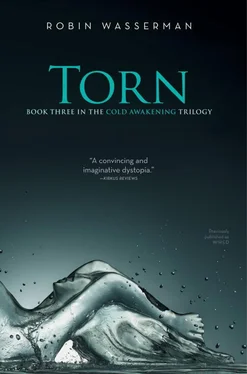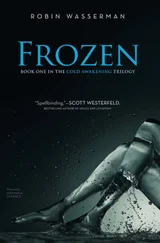After the accident it had quickly—though maybe not quickly enough—become obvious that I wasn’t the same person I used to be. It had taken another year to figure out that Zo wasn’t either. But I finally got it. She was, after everything, still my little sister. But she was also Zo Kahn, someone I’d never bothered to know, not really—and now that I did, it was clear that protecting her from herself was neither an option nor a necessity. It was also clear that, as far as she was concerned, this wasn’t just my fight. It was ours. So she was going to risk everything for it. And I was going to let her.
It had been easy enough for Zo to hack through the priv-walls on Ben’s zone to discover he lived on a modest estate less than twenty miles away. The zone offered a cornucopia of Ben trivia: He lived alone, on the opposite coast from his ex-wife and teenage daughter, who, judging from the number of plaintive messages he sent her and the nonexistent response, wasn’t any fonder of her father than I was of mine. The girl looked less like Zo than I’d thought when I first saw her picture—the stringy hair and baggy clothes were the same, but her features were smoother and more rounded. She had the same soft, waxy beauty as her father, if none of his impeccable fashion sense.
The house itself wasn’t that impressive. It was half the size of ours, with barely any grounds, and what there was had fallen into disrepair. Kudzu crawled up the decaying brick, nearly blocking out the windows, and the weedy, browning lawn clearly hadn’t been trimmed or watered in months. The security system was a sad, bargain-basement model—probably because no burglar in his right mind would choose a house like this to burgle when there were so many better options on offer—and Jude had no trouble jamming the alarm, shutting down the electrified perimeter, and easing open the back door.
“You’re good at this,” I said softly.
“Practice makes perfect,” he muttered.
I didn’t want to know.
It was well past midnight, and the house was completely dark. Auden, with a minimum of whining, had agreed to wait in the car under the theory that every criminal operation needed a getaway driver. Zo, Jude, and I used our ViM screens to light our way, and took our time making our way through the house, just in case we stumbled across anything relevant. Like a giant blinking poster detailing the logistics of phase three. Or a rabid guard dog.
Fortunately or unfortunately, there was nothing but a bare, personality-free house, with empty walls and furniture that, for the most part, appeared completely untouched. The kitchen was empty of both food and standard appliances. Breaking into someone’s house was different from breaking into a corp—it felt almost like we were peering inside call-me-Ben’s head, and, much as I disliked the guy, I couldn’t take much pleasure in the fact that the view was so pathetic. The only sign that someone actually lived here was the occasional pic of his daughter, some from years ago, some clearly recent, the only commonality between them the fact that Ben was never in the shot.
We crept up the stairs, peeking silently into each room we passed. The first was a closet, the second a marbled bathroom, and the third a true surprise: a cluttered laboratory, its tables and shelves filled with spare mech parts, its whiteboard walls covered with Ben’s messy scrawl, circuit diagrams dotted with question marks and the occasional exclamation point. Ben may not have gotten much living done in his house, but apparently that was because he was too hard at work. Against my will I felt another stab of sympathy, one that was easy enough to suppress when I reminded myself what he was probably working toward . We fanned out through the lab, searching for anything that screamed death to mechs , but none of us was particularly well equipped to analyze his equipment or the thrust of his research. Ben was one of the lead techs at BioMax, and had led the team that designed the original download technology—he could be working on anything, and we weren’t going to figure it out by studying his circuit boards. He would have to tell us.
The next door was the bedroom.
I held the gun. Jude cleared his throat. Ben woke up. There was a moment of sleepy confusion; then he saw the muzzle pointed at his forehead, and bolted upright. I stood at the foot of the bed, about five feet away from him. Far enough that he couldn’t do something stupid, like lunge at the gun. Close enough that even I couldn’t miss. Zo waited in the hallway, just outside the door, on guard for reinforcements we weren’t expecting—and, if it came to that, reinforcement herself if Ben proved somehow, unexpectedly, able to take on me, Jude, and a nine-millimeter pistol. The weapon was just as heavy as I remembered, but it fit more comfortably in my hands this time. The safety was off.
“What is this, Lia?” Ben asked in a low voice. I could tell he was trying not to show fear, but his eyes darted back and forth, from Jude to me to the gun and back to Jude again. He was afraid. His hand inched toward the nightstand.
Jude shook his head. “I wouldn’t,” he said. “Unless you think your trigger finger’s faster than hers is.”
Even a low-budget security system came with silent alarm switches that could be conveniently positioned around the house. Maybe Ben had just meant to turn on the light, or reach for his ViM. But there was no point in taking the chance. “I’d listen to him,” I said.
Ben did.
“What are you doing here, Lia? What are you doing with that ?”
“You think he’s talking about the gun, or about me?” Jude asked.
Ben wore a set of checkered flannel pajamas. His quilt was navy, with a thick black trim. For so long he’d been this BioMax boogeyman, always one step ahead of me, ready to cajole or blackmail or smarm his way into getting whatever he wanted. But now he was just a guy. And kind of a sad, small one.
“What’s phase three?” I asked.
“What?”
“You’re going to the server ship on Sunday. What are you doing there?”
“I told you before, we’re dealing with the virus—Look, is this about Riley?” He sounded almost impatient. “Because if it is, I was just trying to help. I didn’t know about the stored file until recently, and this really isn’t necessary; I can—”
“Shut up. This isn’t about Riley. What’s phase three?”
Ben swung his legs toward the side of the bed like he was about to climb out.
“Don’t move,” I said.
He shook his head. “You’re not going to shoot me, Lia.”
“You’re so sure?”
“I know you,” he said, the same old Ben, sure he knew me better than I knew myself. “This isn’t you. Him, maybe, but not you.”
“I’m choosing to take that as a compliment,” I said. “But I’m guessing he will too.” Never taking my eyes—or the muzzle—off of Ben, I handed the gun over to Jude. Just once, I’d wanted to see how it felt to have the power over Ben, the control, to know he had to do what I wanted. But I couldn’t have pulled the trigger. I knew that, and he knew that.
For this to work we needed someone who could.
“Get back in bed,” Jude said. Ben did as he was told. “You want to tell me this isn’t me?” Jude sneered. “You want to tell me I don’t have it in me?”
Ben was a good liar, but apparently not that good. He gripped the edge of the blanket, tugging it around himself like it was bulletproof. “What do you want?”
“Phase three,” I said again.
“You keep saying that, and I’m telling you, I have no idea .”
We went back and forth several times, until it was made clear that Ben was either far more courageous or more clueless than we’d given him credit for, because even with a gun in his face—wielded by a mech who would have loved nothing more than to pull the trigger on the man who’d delivered the news of Riley’s death—he gave us nothing. I’d suspected all along that Ben wasn’t behind BioMax’s planned eradication of the mechs. He was too impassioned about the technology, too grossly sincere in his desire to help us, in his need to be liked . So maybe they’d kept him in the dark. It didn’t mean he couldn’t help us, willingly or not.
Читать дальше












